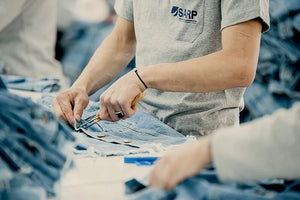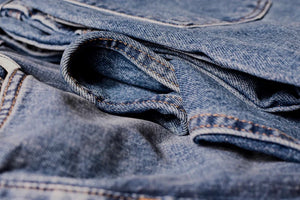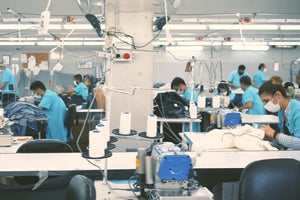The GOTS organic certificate
Aug 21, 2020
GOTS certification ensures that textiles labeled "organic" are manufactured according to ecological and socially acceptable standards. Only certified manufacturers are allowed to use this seal of quality.
GOTS is the abbreviation for Global Organic Textile Standard and was founded in Germany in 2002. The standard specifies the conditions under which organic clothing can be manufactured. Companies that comply with this standard can be certified according to GOTS.
In recent years, the demand for ecologically and ethically responsible fashion has increased significantly. This increases the importance of GOTS. The global standard takes into account all relevant health and environmental issues as well as social factors. More and more manufacturers are now showing that fashion can be attractive, modern and sustainable at the same time.
Products made from natural fibers bearing the GOTS label are produced without chemical pesticides and fertilizers. They therefore support a healthy, sustainable and socially responsible lifestyle with minimal negative impact on air, water and soil.
Key elements of GOTS
- GOTS checks all relevant ecological and social aspects
- GOTS means that predominantly organic raw materials are used
- GOTS controls all suppliers and manufacturers along the production chain
- GOTS enables independent certification through on-site inspections
Inspections, laboratory testing and certification are key elements of the global standard. The following points cover these aspects in detail (click on the text to expand it):
On-site inspections
Qualified inspectors visit each production site and check the conditions on site. They follow the entire production process from the origin of the fiber to the sale of the finished textiles. While many standards only refer to the raw materials, GOTS follows all stages of production: cleaning, spinning, weaving, dyeing, finishing, sewing.
Laboratory residue testing
Samples are taken at different stages of the production process: from raw materials as well as from finished products. In laboratories around the world, these samples are examined for traces of unacceptable pesticides or chemicals. The global standard stipulates that textiles with the GOTS label must also meet quality standards. The clothing is checked for possible shrinkage and its resistance to sunlight, sweat, saliva or friction in the washing machine.
Avoiding contamination
The GOTS label also takes into account all accessories such as zippers, buttons, shoulder pads or appliqués. These must also meet the high GOTS requirements when it comes to health or environmental impact. The inspector ensures that the production of GOTS-certified goods takes place separately from the production of conventional textiles so that there is no risk of contamination.
Socially acceptable working conditions
The inspector checks the working conditions in the production facilities, for example whether the facilities are hygienic or whether there is adequate lighting and ventilation. It also ensures that there is no child labor, that employees receive a fair wage and that they have the right to organize themselves through unions. The inspectors question the employees about the working conditions and also check on site whether all criteria are met.
No harmful chemicals
The inspector checks which chemicals are used and whether they are permitted. The global standard stipulates that dyes, prints, plasticizers and other additives used in the manufacturing process must meet the highest standards. This ensures that everything that touches the consumer's skin is safe for health and that the environment is not harmed.
Each chemical substance must be evaluated by laboratory tests or other appropriate methods and registered by an approved certification body before a manufacturer is authorized to use it.
Prohibited substances
At no point in the process may harmful materials such as toxic heavy metals, formaldehyde, aromatic solvents or chlorophenols be used. All substances used must meet high standards regarding aquatic toxicity and biodegradability in order to minimize environmental impact.
Third-party certification
Based on the results of the inspection, the manufacturer is issued a certificate by a registered certification organization. These certifiers must themselves be officially accredited to ensure that they are independent, competent and reliable. In the case of TORLAND, the certification was carried out by CERES GmbH from Germany.
Consideration of demand and production possibilities
The textile production process is carefully monitored by GOTS, but it must also meet the needs of consumers and the options available to manufacturers. Dyeing is allowed, but the dyes used must be specifically approved so as not to be harmful to health or the environment. Likewise, finishing the textile to make it fit and soft is possible, for example, but only through physical treatment such as heat exposure or by using specially approved aids. In this way, the global standard is realistic and practical.
An important aspect of the global standard is the concern for the responsible purification of the water used. Appropriate wastewater treatment facilities are intended to reduce water pollution.
Only companies that comply with the above criteria are awarded the GOTS certificate. These are listed in the GOTS database . It is a valuable tool for producers, buyers and consumers.
Guarantee for the designation «organic»
GOTS distinguishes between two quality classes: "made from organic" and "organic". The quality class "made from organic" means that at least 70% of the fibers are certified organic. The quality class "organic" even requires 95% certified organic fibers. 100% is often not possible because synthetic fibers are sometimes required for the strength or stretch of textiles. The GOTS label takes this into account.
Certified organic natural fibers from plants such as cotton are produced without chemical pesticides and fertilizers. The plants and animals used have not been genetically modified. Animals that produce wool have been raised in accordance with the relevant standards for responsible animal husbandry.
Ethical fashion
Today, consumers are increasingly aware of the environmental impact and problematic working conditions in textile production. The GOTS label ensures transparency and product safety so that consumers know that their clothing is not only produced ecologically, but also ethically.
The creation of GOTS
The textile industry is a global industry on a gigantic scale. The production and supply chains span all continents. Millions of women and men are involved in textile production and distribution and are sometimes exploited. Soil, water and air are heavily polluted by means of transport, washing plants, dyeing plants, etc.
In the late 1980s and early 1990s, the first environmental regulations emerged in Europe. At that time, hundreds of harmful chemicals were used in textile production. Governments in producing countries also began to develop various eco-labels. Many private companies also came up with their own eco-labels, and each label had its own criteria. However, what all of these labels had in common at that time was that they only referred to the final product. They looked to ensure that the finished product was clean, non-toxic, had no harmful effects on the skin, and so on. However, they did not take into account what happened during the production of these items.
Later, the approach changed and people started to look at the life cycle of a product and the sustainability of a product. The initiatives came from Japan, the UK, Germany and the USA. From these countries, various experts came together in 2002 to draft the first version of the GOTS standard for textiles.
They were supported by interest groups, environmental organizations, trade unions and members of the industry. These organizations are now working on developing the standard in an international working group. New technologies and findings are constantly being incorporated into GOTS specifications so that the standard is always updated. Because the industry itself is involved in developing the global standard, the standard is practical and workable. Realistic and achievable limits are set.
Thanks to clear standards and regular checks, consumers can now trust that products bearing the GOTS label are manufactured under ecologically and socially acceptable conditions.
Sources:




